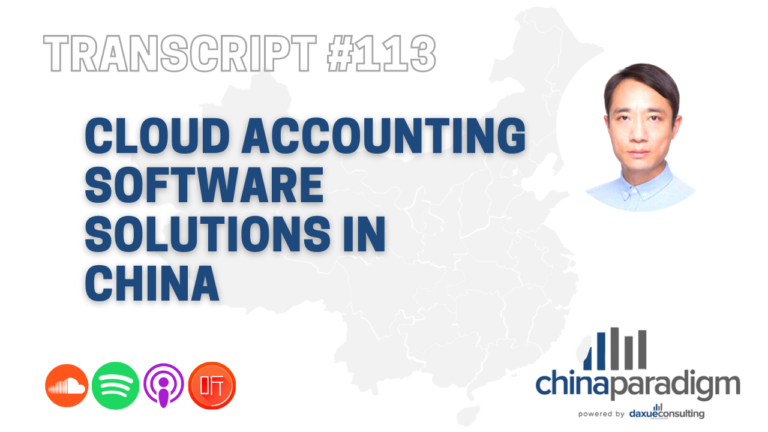The rise of AI, data analytics, and cloud computing, along with the increased demand for software solutions in consumer and enterprise sectors, are driving growth in the global software industry. The COVID-19 pandemic has also played a major role in accelerating digital transformation, hence leading to more companies and institutions embracing digital technologies. The worldwide revenue for software was $532 billion USD in 2020 and is expected to grow further. The global software industry has many opportunities to offer Chinese software companies expanding overseas. However, the industry is constantly bombarded by disrupters and is undergoing constant change. Market complexities and lack of experience can also hinder companies’ global expansion plans. Find out more about global software marketing strategies that will help you expand internationally.
Why Chinese software firms should consider going abroad
Foreign markets serve as an important growth engine for western software companies. Google and Facebook both earned more than 50% of their revenue overseas. Microsoft, which provides enterprise-wide software solutions and cloud services, earned 48.8% of revenue outside the United States. Salesforce and Adobe, leading players in cloud-based software, earned 30.6% and 42% of their revenue abroad respectively.
On the other hand, Chinese internet giants are still mainly focusing on the domestic market. Alibaba’s overseas income accounted for less than 7% of its total revenue in 2020. Similarly, Baidu earned almost all of its revenue in China.
China’s enterprise software market is growing rapidly, but is still far from reaching its full potential. Its market value is estimated to be around 172 billion yuan ($26.6 billion USD) in 2019, accounting for less than 7% of the global enterprise software market. This can be due to reasons such aslow adoption of enterprise software, lack of trust in data security, software piracy, and attitudes towards the value of software within China.
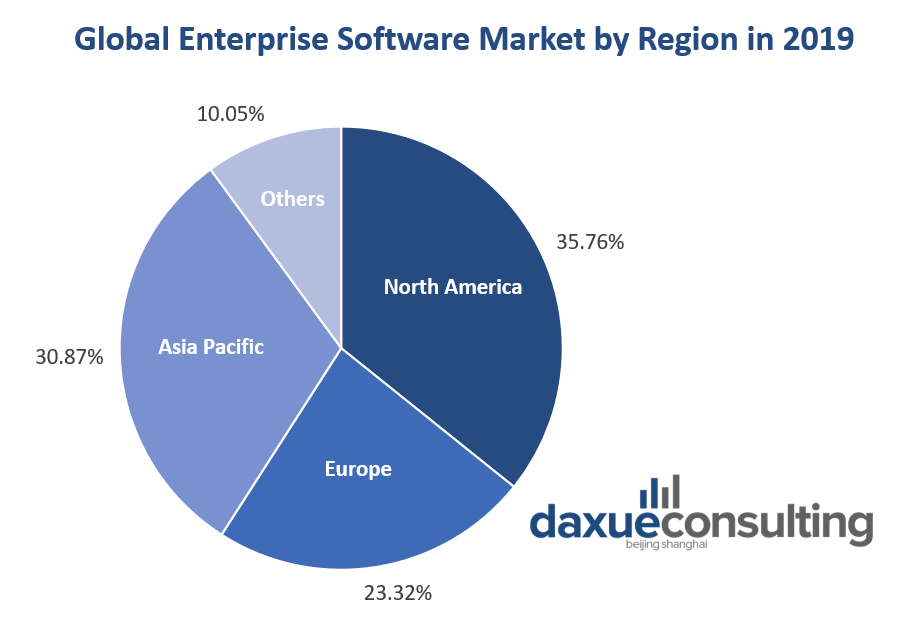
Data source: Maximize, designed by Daxue Consulting, North America remains the largest enterprise software market followed by Asia Pacific and Europe
Chinese software firms have sufficient digital capacity to expand overseas
The Chinese technology industry is closing the gap in terms of technical capabilities as a result of globalization, fierce competition among local companies, government policies, and increasing investments on IT and cloud infrastructure; all of which have constituted the backbone of China’s digital economy. Software cities such as Beijing, Shanghai, Shenzhen, Guangzhou, Hangzhou, and Nanjing are home to a number of tech startups in the past decades. According to a McKinsey report, in 2017, one third of the world’s start-up firms with valuation over 1 billion USD were based in China.
China has advantages in terms of the sheer size of its internet users, the massive data they create, and a generation that is receptive to technology, making the local market an ideal ground for Chinese software firms to test and innovate. Nonetheless, the 10 leading firms in the global enterprise software market are all from the United States and Europe.
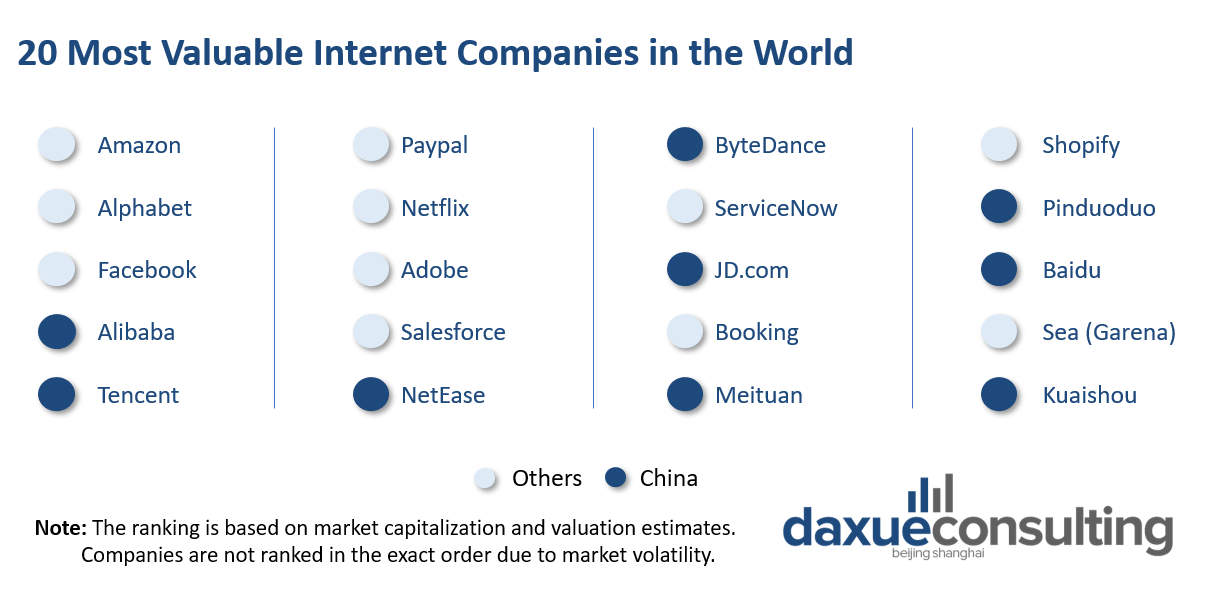
Data sources: Nasdaq, Statista, and Wikipedia, designed by Daxue Consulting, almost half of the top 20 most valuable internet-based companies are from China
Global software marketing strategies: What do successful global software companies have in common
An easy-to-navigate user interface
Overly complicated software and long tutorials can turn customers away, even if they have many attractive features. Generally, the role of software is to simplify and expedite work processes. Most importantly, the software should communicate a clear goal and have a user-friendly interface that requires minimal explanation. Compared to Chinese netizens, westerners are more averse to digital clutter Therefore; a Chinese software product may have to simplify their user interface when catering to a western audience.
Dropbox, for example, has a clear goal and straightforward functions. It helps people store and manage files all in one place, allowing access from anywhere. Dropbox designed its website and apps that align with its slogan “get more work done in less time” through low-friction interfaces. In 2009 or one year after launch, Dropbox reached 3 million registered users.
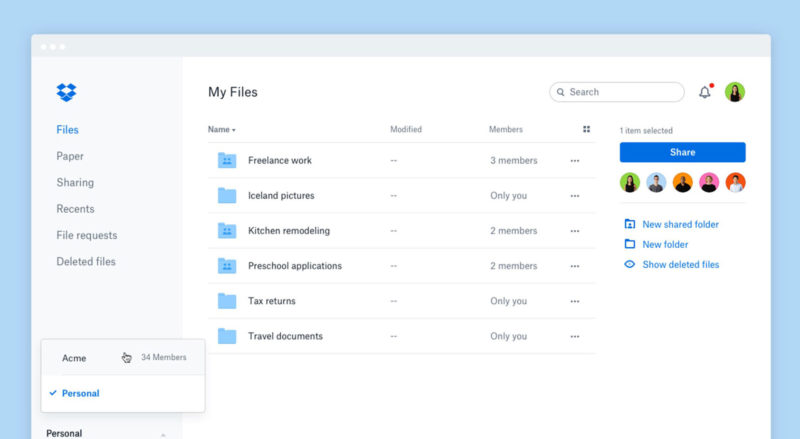
Source: dropbox.com, Dropbox’s webpage is simple and easy to navigate for an average user. A simple and easy to use UI is one of the most important global software marketing strategies
Software naming: The identity of a software
A name can influence the perception of a given software product or service. It is the first thing people see and what they will remember. For the international market, software names should be in English, easy to pronounce, memorable, and meaningful. For example, “TikTok” is a play on tick-tock, the sound of a clock or a term for countdowns, which relates to short videos on the platform. “TikTok” is also easier to remember than its Chinese equivalent “Douyin” for an international audience. A popular online game “Wangzherongyao” (王者荣耀) has an adaptation for the global market called “Arena of Valor”. Adobe “Photoshop”, Microsoft “Office”, and “Facebook” are simple names, yet they imply so much about their core functionalities.Software names such as “Strip”, “Slack”, “AWS”, and “Zendesk” all sound good on the tongue. Lastly, the name must be appropriate in any country or language.
When re-naming software for the international market, it is best to do brand-naming research and testing. Daxue consulting believes that a good brand name is 80% research and 20% creativity. This doesn’t limit the creativity of the name, rather focuses on what consumers are proven to be receptive to. Learn more about our process for brand naming.
The use of online channels to boost growth and brand outreach
Compared to traditional marketing channels, digital marketing offers software firms more value because of its effectiveness, cost reduction, quick feedback, and data. The following are common and effective digital software marketing strategies:
- Offering a free demo or trial version – people are more willing to pay for the software when they have tried it. A software demo or trial version allows potential users to experience the software themselves and understand its functionality and features; it can show how they can benefit from purchasing the software.
- Create content or a blog online – having useful and relevant information will not only attract potential customers to your website, but also make your brand trustworthy, increasing the chance of them buying your software product.
- Paid campaigns – established global software companies all invest in digital forms of advertisements, whether via search engines, other websites, or media platforms. Software firms can use online campaigns to educate people about their software, increase brand presence, and improve sales.

Source: YouTube, Tableau’s video advertisement on YouTube that quickly informs viewers the functionality and benefits of the software
Customer support ensures long-term satisfaction and sustainable growth
A constant support pertaining to bugs, crashes, security, latency issues, and other usage problems is essential to keep customers satisfied and motivate them to continue using your software. Retaining customers is cheaper and more efficient than acquiring new ones. According to BCG research, a 5% increase in customer retention rate can raise profits by 25% all the way up to 95%. Acquiring new customers can cost five times more than retaining existing ones.
Shopify is an example of a company with exceptional customer support. The firm provides retailers and merchants with a suite of cloud-based services that helps them operate stores online. Shopify’s business model strongly emphasizes customer success. It has dedicated support teams that customers can reach 24/7 via phone, email, and live chat for help solving any technical problems. In 2020, Shopify earned $2.9 billion USD and partnered with over 1 million businesses worldwide.
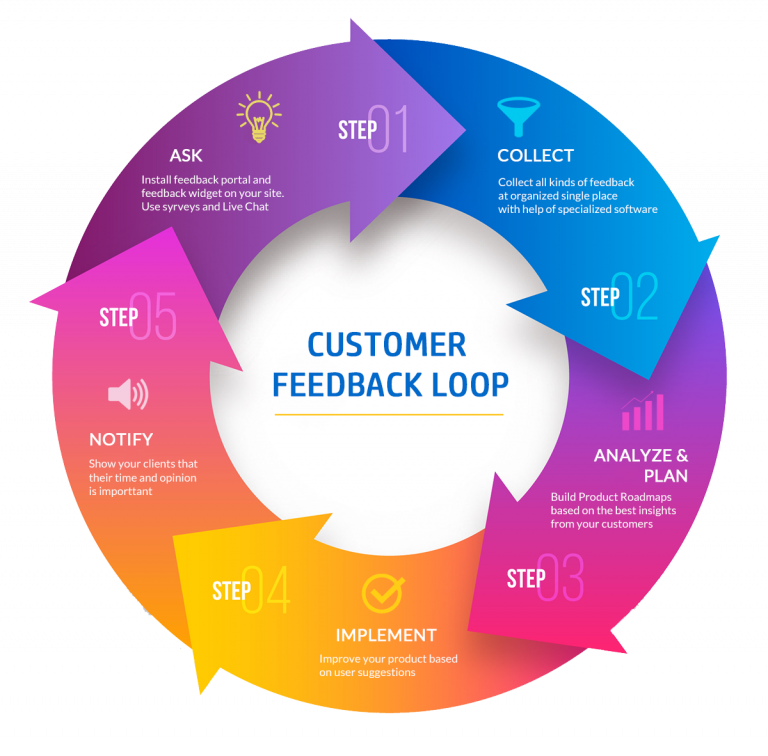
Source: UseResponse, Global software marketing strategies, the cycle of customer feedback and company response leads to continuous improvement of a product or service
Software distribution: How to sell and distribute software to global customers
- Direct-to-Consumer (DTC) Approach – selling software directly to customers on your own website.
This approach is suitable for software firms that aim to build their brand from the bottom up. It requires firms to have an integrated website that supports POS, decent brand presence, strong marketing campaigns, and a sales team to reach and attract potential customers to buy software on your website. This can be difficult for small software developers that do not have enough resources and expertise in these areas.

Source: larksuite.com, Lark (also known in China as Feishu) has a separate website for international audience
- Through an intermediary – selling software with help from software distributor or partner programs
This approach is suitable for software firms that do not yet have a website that is optimized for a global audience and à who lack a large amount of resources for marketing and sales campaigns. Software distributors can help reach customers that you could not reach on your own by leveraging their brand reputation, sales channel, marketing, and support. However, selling through an intermediary means giving up some control over your software sales and brand development. In addition, you have to adhere to their regulations and will usually pay commission fee on top of upfront costs. Reputable software firms such as Autodesk, HubSpot, ServiceNow, Intuit, and Dassault Systèmes have partner or supplier programs.
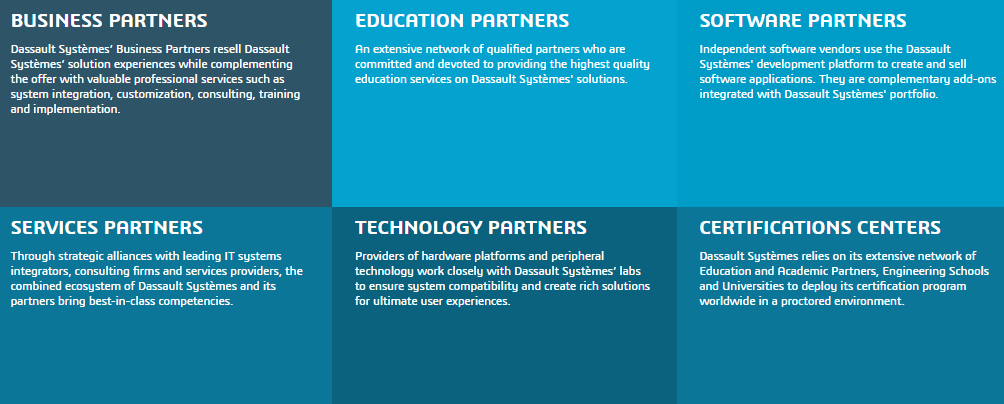
Source: 3ds.com, Dassault Systèmes’s partnership programs
Case studies of successful Chinese software companies which have expanded overseas
Kingsoft’s global software marketing strategies for WPS Office
Microsoft first released MS Office in 1989, the software which revolutionized the way we work. For decades, Microsoft dominated the office software market with no clear competitor. In 1988, Kingsoft, a cloud computing company in China, (金山软件) released WPS office when computers had become more widespread. Before MS Office entered China, WPS Office had already acquired 90% of the local market share. In the late 1990s, Kingsoft’s struggles with software piracy and competition with Microsoft almost drove the company to bankruptcy. Kingsoft turned things around when it launched WPS 2005 with nearly matching features to MS Office while offering lower pricing and a free version. In 2007, the Chinese software firm began expanding overseas.
Affordable Pricing
WPS Office’s expansion mainly focuses on gaining more users or monthly active users (MAU) through its freemium model, attractive pricing, and multiplatform support. The company aims at promoting WPS Office as the best alternative to MS Office with additional features.
Compared to MS Office, WPS Office is efficient, yet more affordable. It offers a completely free version along with premium versions for much lower prices.
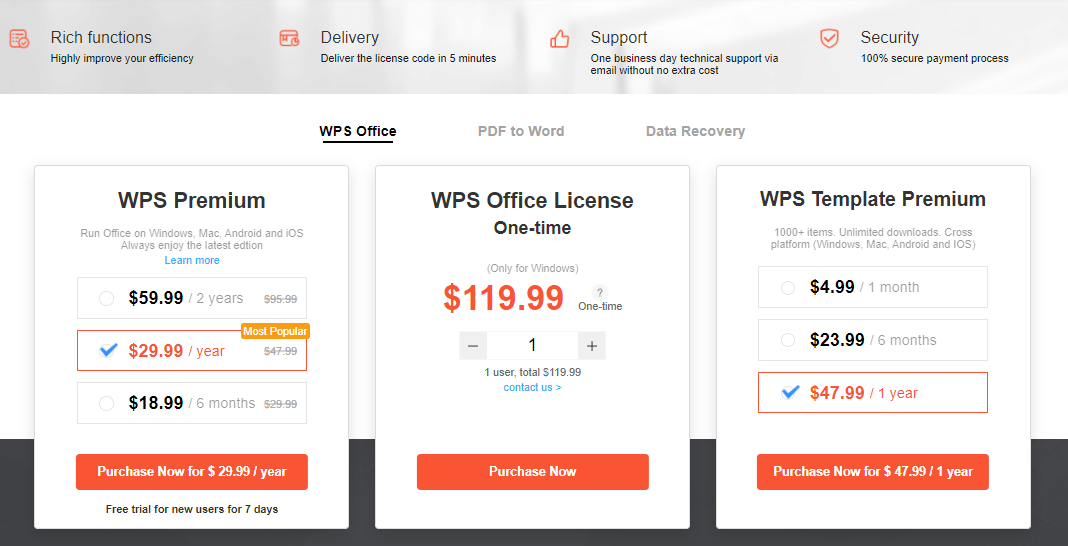
Source: wps.com, subscriptions and license pricing for WPS Office premium
Accessible and compatible with various formats
WPS office suite is available across platforms and is compatible with many formats including MS files. WPS Office has similar layouts to MS Office, making it effortless for users to switch between the two. Another key selling point is its unified interface; WPS Office allows user to seamlessly work on multiple files in one page, eliminating the hassle of having many windows open. This software also has functions such as PDF editor, PDF to Word converter, and electronic signs built in with it, whereas MS Office does not.

Source: wps.com, WPS Office is an all-in-one office suite that combines word processer, presentation, spreadsheet, and PDF editor in one place
Focusing on the needs of a specific target audience
Although MS Office still dominates the market, WPS Office has gained a large user base in China, India, and other Asian countries. Instead of competing head-on with MS Office, Kingsoft focuses more on cost performance, lighter software size, and an easily-navigable mobile platform to win users. These strategies work well especially in lower income countries that have a high number of smartphone users. In 2019, Kingsoft’s revenue from office software subscriptions and advertisements was $250 million USD, a 43% increase from 2018.
Alibaba Cloud
Alibaba Cloud was founded in 2009 in China, and by 2021, had provided services to enterprises, developers, and government organizations in more than 200 countries and regions.
Leveraging an ample base of resources
Alibaba Cloud’s success can firstly be understood as being due to Alibaba Cloud’s position as part of the larger Alibaba Group. According to former General Manager of Alibaba Cloud EMEA, Yeming Wang, being part of the wider Alibaba Group enables Alibaba Cloud to leverage upon various sector insights and expertise. This then results in Alibaba Cloud successfully supporting a diverse range of businesses worldwide.
Even though it may be challenging for businesses to expand and diversify to the extent that Alibaba accomplished, an ample base of resources can also be built up for instance through networking with relevant industry partners. This would then enable Chinese software companies hoping to expand overseas being able to gain a footing in unfamiliar familiar foreign environments.
Special emphasis on transparency
Chinese software companies hoping to expand globally should also ensure they are transparent with potential users regarding Security and Privacy Compliance. Alibaba Cloud has a specific page for its ‘Trust Center’, on which it highlights country/region-specific regulations and Alibaba Cloud’s capabilities and past experiences in addressing compliance risks.
In addition, Alibaba Cloud also has significant information regarding its compliance program, with a list of attestations and certifications similarly displayed under its Trust Center.
Emphasizing transparency while expanding overseas is especially important for Chinese software companies due to unfamiliarity towards Chinese products, and a certain level of negative stereotypes towards Chinese technology from Western countries.
To learn more about global software marketing strategies For Chinese companies expanding abroad, contact our China outbound project team at dx@daxueconsulting.com. Learn more about our outbound consulting for Chinese brands at strategy7continents.com.




